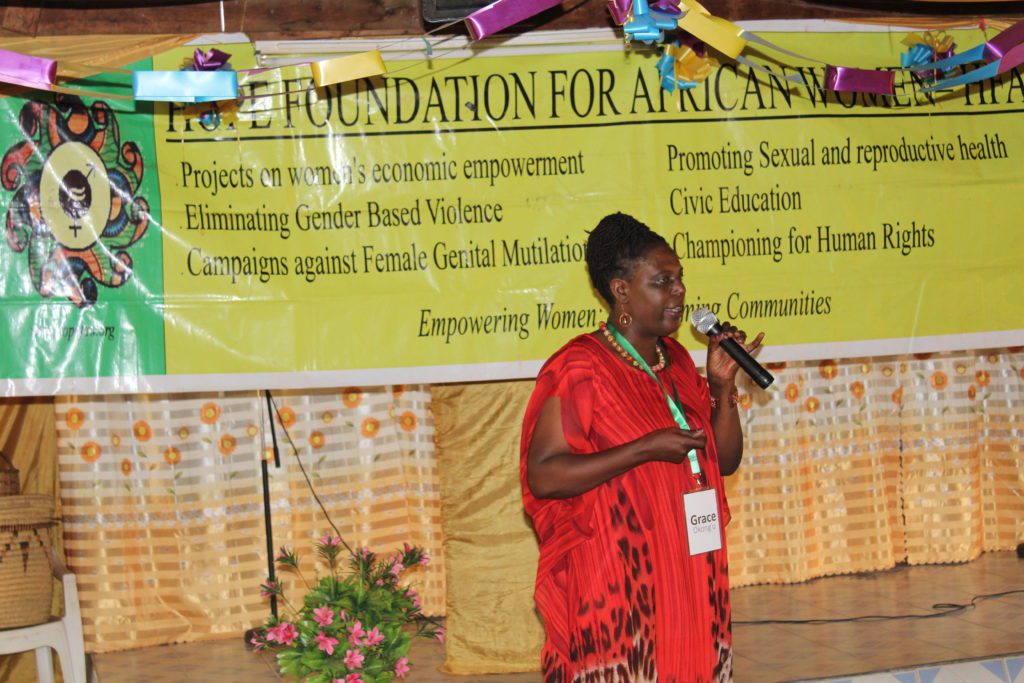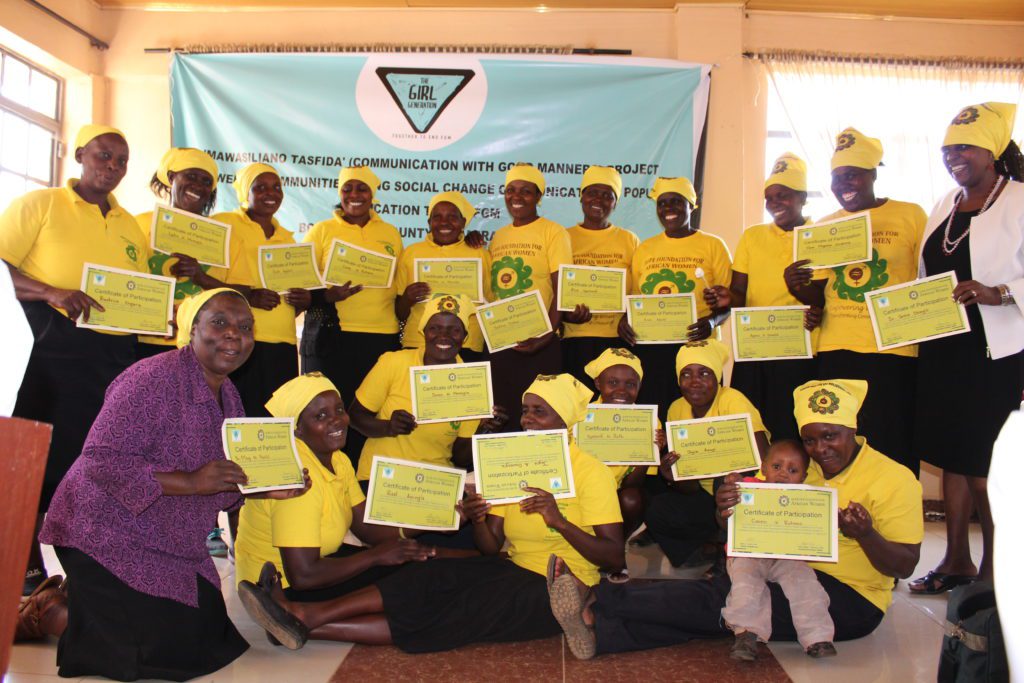In observance of International Day of Zero Tolerance for FGM, Grace B. Mose Okong’o shares Hope Foundation for African Women’s innovative work combating FGM in Kenya.
Growing up, I only knew one girl whose parents did not cut her. She grew up in misery because no girl or woman would associate with her. Later, she had two children as a single mother. People said, “Look here, see what happens to those who are not initiated. They can’t find husbands.”
When my time came to be initiated—as the village called it—I did not like the idea.
I had seen my older sister recover from the cut, in her seclusion hut, and knew it was no cup of tea. So every cutting season, I kept running away.
Anyway, one day I was caught up with.
I have had many challenges and difficult experiences in life—FGM is one that is hard to forget. All my life I wondered why a painful, traumatizing act had to be done by people who love you so much on the most important and sensitive part of the body. It has become my lifelong promise to find out why and discover how to end it.
***
In the Abagusii community where I was born and raised in southwest Kenya, the views about female genital mutilation (FGM) are as diverse as those who defend it and those who fight for its demise.
There, nearly every girl and woman has been cut.
In 2007, I spoke at a small event in New York City mainly attended by African immigrants. It was the fourth annual International Day of Zero Tolerance for Female Genital Mutilation.

A postdoctoral fellow sister with Sierra Leonean origins was also invited to speak. We both were experienced and well-researched about the practice.
As we began our presentations, the room became slowly but progressively supercharged—I thought it was going to burst into fire. I called for the end of FGM, whereas my Sierra Leonean sister called it empowering. [Read the article about this event.]
Everyone in the room became emotional. How could anyone so educated defend this horribly harmful practice?
But that is not the point. The point is this event made me realize something: Ending FGM is not that simple.
***
After studying theoretical popular education (PE) for my doctoral thesis, I learned that EPES Foundation in Chile was using the method in practice, so I traveled to Chile to participate in the international school on PE. I was inspired to launch Hope Foundation for African Women (HFAW) in Kenya shortly after. Later, I took five other women back to Chile to learn how to implement PE to end FGM.
Popular education, which follows the model of Brazilian educator and author of Pedagogy of the Oppressed, Paolo Freire, is a critical consciousness-raising that involves the whole community in the art of self-questioning. It is a bottom-up approach which gives people leadership to ask: What is this practice, what is the cause of it, what is the effect of it on us, and what can we do together to end it? The model does not provide answers, but facilitates the community itself going through a process of discovery by themselves. Then, they reflect and take action.
At HFAW, we began by training women as community health workers. Working with the village women has led to so many discoveries.
Women know who does the cut. They know who believes in what, who is true to ending the practice, and who is pretending to have ended the practice.
That is why it was critical for us to turn our mothers—village peasant women—into anti-FGM activists and health promoters. Young girls learn who they can run to if they are threatened by the cut.

Lately, our new discovery is around engaging men. Putting men in a separate room and having respectful dialogues with them has had a profound positive impact towards ending FGM.
When you ask men why FGM continues in Kisii, they will tell you it is the women who do it. Yet everyone knows that FGM will not end if men have not said no to it.
In our workshops, men meet with confident FGM survivors. We show them a video of FGM in different communities. Then we ask them: what are you seeing, what is the cause of that, what is the effect of that in the community, and what can we do together to end it?
Then, we work with experts to explain the function of the clitoris, the nerves that are cut, the damage that is done, issues arising years later for some women, sexual difficulties encountered, and health problems such as childbirth issues, stillbirths, and obstetric fistulas.
Because we believe in creating an environment where people share ideas, experiences, and feelings, people share intimately.
Survivors share why their
“Because of the cut, I take longer to orgasm,” said one survivor during a workshop. “My husband gets satisfied and sleeps without a care. He does not understand that I also need to get satisfied, so I am left angry for weeks.”
“Why won’t the wives tell their husbands when they are not satisfied?” asked one man.
“During circumcision, we were taught not to show promiscuous behavior,” the survivor explained. “If we ask, our husbands may think we have become prostitutes. It is for him to know how to pleasure me. He has to know that he functions like gas, while I function as a charcoal stove which needs a lot of work before food can be cooked.”
The whole room laughs, but intimate lessons are learned. Such intimate conversations happen for hours and then begin the next day.
During the training, Haron, one of the participants said, “Watching this video is the most disturbing thing I have seen this year. We fathers we just say to our daughters, ‘Go, and be cut!’ or to our wives, ‘Take them there!’ We have never seen how it is cut. This is real torture we are doing as the Abagusii community. Some mothers do not even do it out of willingness, but do it because they want to please us men! This is not right at all. From today I am not going to sit and watch my daughters and nieces and friends succumb to this torture.”
“If we men roar, FGM will scatter!” said Haron after a workshop.
Thomas, a retired nurse and one of the participants, said, “I did not have knowledge about the dangers of FGM. But after the training and listening to the testimonials told by the community health promoters, I am more than ready to join efforts in ending FGM. We have the power to end this.”
Yes, ending FGM is not simple, but each time a survivor speaks out, each time someone like Thomas makes a pledge to stop it, each time a girl runs to be rescued from FGM by a health promoter, I know my lifelong promise is not in vain.
International Day for Zero Tolerance for FGM is observed every year on Feb. 6. This year, join Grace’s efforts to #EndFGM by donating to Hope Foundation for African Women.
Featured Photo: Grace B. Mose Okong'o by Hope Foundation for African Women
Find exactly what you're looking for in our Learn Library by searching for specific words or phrases related to the content you need.